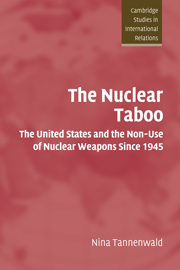Book contents
- Frontmatter
- Contents
- Preface
- List of abbreviations
- 1 Introduction: the tradition of nuclear non-use
- 2 Explaining non-use
- 3 Hiroshima and the origins of the nuclear taboo
- 4 The Korean War: the emerging taboo
- 5 The rise of the nuclear taboo, 1953–1960
- 6 Nuclear weapons and the Vietnam War
- 7 Institutionalizing the taboo, 1960–1989
- 8 The 1991 Gulf War
- 9 The taboo in the post-Cold War world
- 10 Conclusion: the prospects for the nuclear taboo
- Select bibliography
- Index
- CAMBRIDGE STUDIES IN INTERNATIONAL RELATIONS
4 - The Korean War: the emerging taboo
Published online by Cambridge University Press: 22 September 2009
- Frontmatter
- Contents
- Preface
- List of abbreviations
- 1 Introduction: the tradition of nuclear non-use
- 2 Explaining non-use
- 3 Hiroshima and the origins of the nuclear taboo
- 4 The Korean War: the emerging taboo
- 5 The rise of the nuclear taboo, 1953–1960
- 6 Nuclear weapons and the Vietnam War
- 7 Institutionalizing the taboo, 1960–1989
- 8 The 1991 Gulf War
- 9 The taboo in the post-Cold War world
- 10 Conclusion: the prospects for the nuclear taboo
- Select bibliography
- Index
- CAMBRIDGE STUDIES IN INTERNATIONAL RELATIONS
Summary
Somehow or other we must manage to remove the taboo from the use of these weapons.
Secretary of State John Foster Dulles, October 1953Only two years after the Berlin crisis, and five years after the end of the war against Japan, US leaders were again forced to confront the issue of use of nuclear weapons. As the first case of overt aggression against a US ally in the postwar period, the North Korean attack upon South Korea in June 1950 could well have provided an occasion for use of atomic weapons by the United States. The Korean War was the most serious crisis of the first postwar decade. Like the war against Japan, the Korean War was fought against illiberal Asian aggressors. In December 1950, with Chinese troops routing US–UN forces, the Cold War was in full swing. In the eyes of some observers, the United States faced “the greatest danger in our history” including the “destruction of Western civilization and of our American way of life.”
The Korean War was also the first war since World War II in which a country possessing atomic weapons had engaged in combat. Given that nuclear weapons had become the centerpiece of US defense strategy after 1948, there was every reason to expect that US leaders would use their new weapon to defend or advance American interests in any Cold War conflict. Indeed, numerous American military leaders fully expected that this would be the case.
- Type
- Chapter
- Information
- The Nuclear TabooThe United States and the Non-Use of Nuclear Weapons Since 1945, pp. 115 - 154Publisher: Cambridge University PressPrint publication year: 2007

